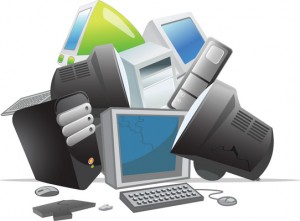
One of the biggest decisions a company or home user has to make after making the decision to upgrade their electronic devices is what to do with the old outdated equipment.
There are still many people and companies out there who are not aware of why it is so important that you recycle your old electronics. I wanted to go over some of the main reasons why all of us should be joining in.
The Federal government requires that companies producing over 220 pounds of electronic waste tested hazardous be disposed of in proper manners.
There are currently no federal regulations for organizations producing less than 220 pounds of hazardous electronic waste, however many states have become more stringent in the proper disposal of e-waste for both businesses and households.
It is estimated that of the approximately 201 million tons of solid waste generated annually in the United States, at least one percent is classified as computer and/or electronic equipment. Of this nearly 2.1 million tons, only an estimated 134,000 tons is actually recycled. Even though e-waste accounts for a small percentage of all municipal waste, it still accounts for about 70% of heavy metals ending up in our landfills.
Some of the toxic materials you can find in old electronics are lead, mercury, arsenic, cadmium, selenium, and more. Computer monitors alone can contain as much as 8 pounds of lead. When these products are just discarded, the harmful toxins will leak out, which is harmful to both the environment and us.
Despite good intentions, much of this nation’s e-waste is exported to developing countries, where processing is done under unsafe conditions and endangers workers and nearby communities. Some progress has been made to end this practice through certification programs. One such program is e-Stewards.
Researcher’s estimate that between 50 and 80 percent of electronic waste from the industrialized world that winds up in the hands of “recyclers” actually goes to a few developing countries: China, India, Pakistan, Vietnam and the Philippines.
 There, the unregulated materials are crudely handled in acid baths and burn pits, releasing into the air and soil heavy metals and chemicals that are used to make flexible plastics and flame retardants.
There, the unregulated materials are crudely handled in acid baths and burn pits, releasing into the air and soil heavy metals and chemicals that are used to make flexible plastics and flame retardants.
Studies of individual scrapping facilities in Ghana and China have measured contaminants and toxic metals like lead present in soil at more than 100 times typical background levels.
According to e-Stewards, recyclers who meet their certification requirements don’t export to developing nations. They follow safe practices for the handling of electronic waste, and adhere to other standards. Many will also reuse and refurbish equipment.
Lastly, when you choose to recycle your electronic equipment; make sure to choose a certified electronics recycler, that way you are ensuring that any data stored on your device is completely removed.
When you just toss an old computer in the trash, you risk having the right hacker find his or her way to your sensitive information. With so many reasons why you should recycle, it is hard to believe that some people could still put their old laptops in the trash.
If you have questions on how to properly recycle your electronic equipment; give us a call and we will answer all of your questions.
(Image Source: iCLIPART)
